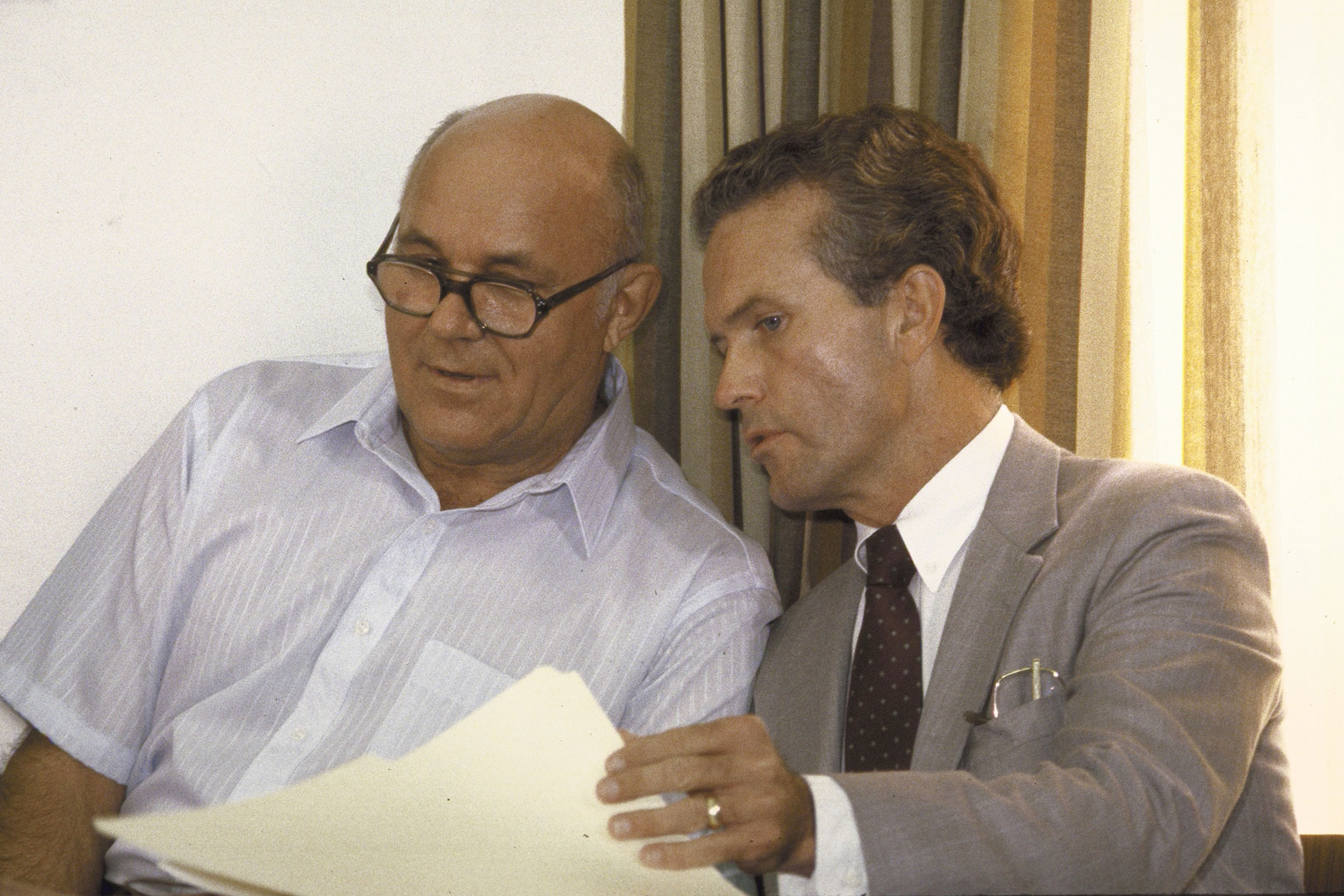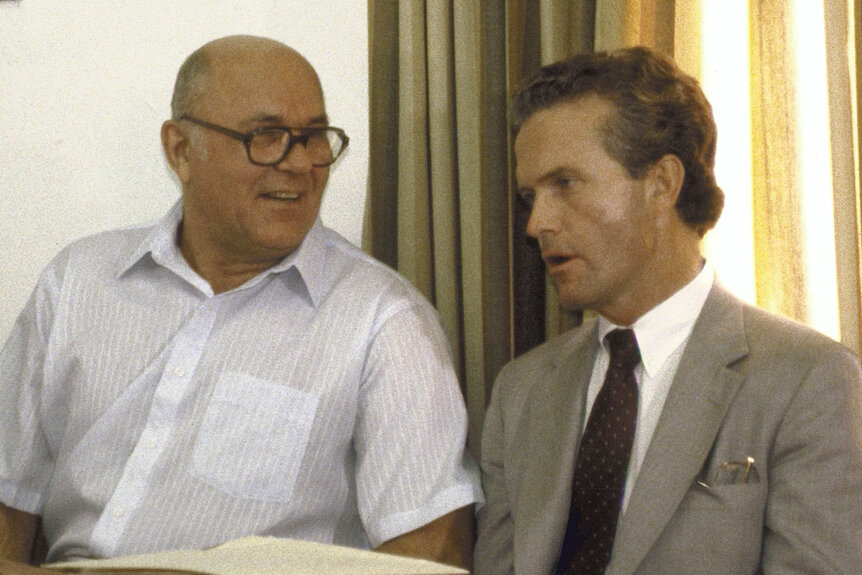Create a free profile to get unlimited access to exclusive videos, breaking news, sweepstakes, and more!
Why Did Alleged Nazi Criminal John Demjanjuk Feud With His Lawyer In 'The Devil Next Door'?
Mark O’Connor, the former chief counsel for accused Nazi concentration camp guard John Demjanjuk, was fired by the Ohio grandfather weeks before testifying at his own war crimes trial in Israel. But why?

After nearly half a year of intense trial proceedings, John Demjanjuk, a Cleveland autoworker who stood accused of being Ivan the Terrible, an infamous Nazi extermination camp guard, was slated to testify at his own trial in Israel in 1987 — but he made an unexpected move, dramatically firing half of his legal counsel.
It was a breaking point in the emotionally exhaustive and groundbreaking trial that had sparked an unprecedented media frenzy. But why did Demjanjuk let lawyer Mark O'Connor, who had served his family for five years, go?
Demjanjuk, who had been accused of participating in the killing of roughly 900,000 Jewish prisoners at Treblinka, an extermination camp in German-occupied Poland, faced the death penalty, according to the Los Angeles Times. He had recently been extradited from the U.S.
All along, Demjanjuk had insisted he was innocent, and that the accusations against him were nothing but a case of mistaken identity.
Behind the scenes, however, his legal team was fractured. A rift had developed between chief counsel Mark O’Connor, a Buffalo, New York lawyer, and Yoram Sheftel, a flamboyant Israeli defense attorney, who had been brought on as co-counsel by the Demjanjuk family to help their legal team traverse the Israeli courts system.
Netflix’s new docuseries “The Devil Next Door,” which unravels the infamous trial, touches on O’Connor and Sheftel’s diverging roles in Demjanjuk’s case.
As the war crimes trial stretched out, friction between the two prominent lawyers ultimately led to O’Connor’s sacking just a week before Demjanjuk was supposed to deliver his make-or-break testimony to the court.
At the time, O’Connor’s dismissal was a stunning move. Demjanjuk reportedly had an emotional attachment to his chief counsel, who had loyally served his family for roughly five years, according to the Associated Press.
But Demjanjuk’s life was also at stake. He faced death by hanging, but unfazed by that looming prospect, Demjanjuk, accused of operating extermination camp gas chambers, dismantled and reassembled his legal team days before one of the trial’s most crucial phases.
“Mark O’Connor was more than a lawyer whom the Demjanjuk family hired to defend their husband and father,” wrote author and journalist Richard Rashke in his book “Useful Enemies,” which analyzes Demjanjuk’s case.
“[O’Connor] was a supportive and understanding friend who had hung in there with them for five turbulent, frightening years,” Rashke added.
But Rashke, however, who devotes a chapter of his book to dissect O’Connor’s exit, noted that the defense attorney's termination wasn’t exactly an abrupt decision by the family.
“The list of gripes against O’Connor was long and growing, and sacking him was no spur-of-the moment decision,” Rashke added. “It was months in the making.”
Ultimately, O’Connor’s firing was carried out by the Demjanjuk family, namely, his son John Jr. and his son-in-law, Ed Nishnic, who persuaded Demjanjuk that O’Connor was losing the case, according to “Useful Enemies.” Following a trip to Ohio, the two men reportedly summoned Sheftel to an Israeli hotel room to discuss their grievances with O’Connor. It was April 1987, upward of two months after the trial had begun.
“Ed and I spent a lot of time in Cleveland discussing what’s going on,” John Demjanjuk Jr. supposedly told Sheftel. “And we reached the conclusion that O’Connor is not living up to our expectation. His performance is flawed, and as a result, the defense is in a very bad position.”
In court, O’Connor had attempted to discredit Soviet documents that connected Demjanjuk to the Nazis, claiming they were forged, the Associated Press reported. He had also questioned the memory of the elderly Holocaust survivors, who testified at the trial.
But Demjanjuk Jr. thought O’Connor’s cross-examination of witnesses was “meandering” as well as “rambling and pointless,” according to Rashke.
And three days prior to Sheftel’s hotel meetup with Demjanjuk Jr. and Nishnic, O’Connor had accidentally admitted to Sheftel that he didn’t have a single defense witness lined up, except for Demjanjuk. Sheftel confessed this and told the family that O’Connor had absolutely no defense strategy.
The Israeli lawyer also alleged that O’Connor had been lying to Demjanjuk about how the case had been going. According to Rashke, Sheftel claimed O’Connor was an “autocratic,” bumbling, and “unprepared” trainwreck who was more concerned with the case’s media attention than rescuing his client. If O’Connor stayed, Sheftel allegedly said, Demjanjuk would hang.
Sheftel’s admissions essentially solidified the Demjanjuk’s family belief that O’Connor had derailed Demjanjuk’s case. However, discord between the two attorneys continued to grow, and spilled into the courtroom as the family wrestled over what to do with their chief counsel.
“I wouldn’t buy a used car from Sheftel,” O’Connor once quipped to the media toward the end of his tenure, according to “Useful Enemies.”
A short time later, Rashke explained, O’Connor, who was known for his quick temper, tried to fire Sheftel over a dispute related to the cross-examination of a prosecution witness. But as Rashke described, it was “the final nail into his own coffin.” Instead, it was the American attorney who was canned.
O’Connor later accused Sheftel of “negligence” and “misconduct,” according to the Los Angeles Times. He claimed that the Israeli lawyer had coerced the family into firing him and referred to Sheftel as a “family enforcer.”
“There is nothing more that I am capable of doing,” O’Connor said after Demjanjuk officially dismissed him in a special court hearing.
The family’s response? Good riddance.
“He should have been dismissed weeks ago,” Demjanjuk Jr. told the Times. He called O’Connor’s claims against Sheftel “unjustified” “garbage.”
However, O’Connor’s dismissal may have also had something to do with an alleged personal vendetta Sheftel had with the New York lawyer.
Sheftel, who had previously called the case’s court proceedings a “show trial,” had offended the trial’s three-judge panel, who demanded he apologize, Rashke explained in his book. One of the judges supposedly blasted Sheftel privately in their chambers. O’Connor was present and never stood up for Sheftel, which irked Sheftel.
“He never forgave Mark O’Connor,” Rashke explained.
Demjanjuk, who was convicted and sentenced to hang in 1988, had his case thrown out by Israel’s courts in 1993 after new evidence surfaced indicating a different Ukrainian was in fact Ivan the Terrible, according to the New York Times.
O’Connor, though, supposedly became consumed with doubt regarding his client’s innocence — and his true identity — following his termination from Demjanjuk’s legal team.
“Toward the end, I looked at how calmly and cooly he removed me from this case after I fought for him for so many years believing in him, believing in his credibility,” O’Connor told the Associated Press in 1988. “I began to wonder whether I’d made a mistake.”
Demjanjuk was released and returned to the U.S. in 1993. His release was met with a wave of protests at home, according to the Washington Post.
Demjanjuk died in a German nursing home in 2012 appealing separate war crimes accusations in Munich, where he had again been deported, the Times reported. He was 91.
There, Demjanjuk had been convicted of being an accessory in the deaths of nearly 30,000 Jewish prisoners at Sobibor, another Nazi concentration camp in German-occupied Poland.














